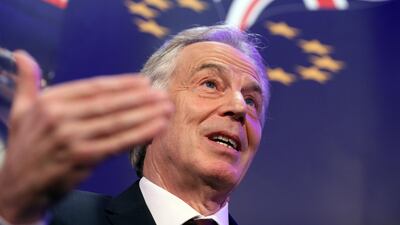The thing I remember most about Tony Blair from the 1990s is his optimism. “Things can only get better” was his political creed as well as his theme song. Only an incurable optimist in 1997 would have thought bringing unionists and Irish nationalists together was likely to get anywhere. I remember saying at the time: “Maybe he doesn’t know anything about the history of Northern Ireland.”
He might not have known about history but he certainly knew how to make it. The Good Friday Agreement brought peace to Northern Ireland – not a perfect peace, but Mr Blair’s optimism was justified. And only an incurable optimist would have thought in the 1990s that the Labour Party – serial losers – could be reformed so profoundly that under Mr Blair’s leadership, it would win three elections in a row with landslides each time.
Some within the Labour Party have never forgiven him for his (and their) success because he abandoned old socialist dogmas.
The only time I recall Mr Blair’s optimism being truly undermined was after the 2003 Iraq war. It seemed not so much the failure to find weapons of mass destruction as the failure – especially on the American side – to prepare for utterly changing the political and economic system of an Arab country whose complexities simply were not understood.
In his farewell speech as prime minister in 2007, Mr Blair reflected with some bitterness on how the media had treated the errors made by him and his team. They were presented not merely as errors but as if his motives were in some way wicked and deceptive. In the dozen or so years since then, our paths have crossed in various locations, from the UAE to Westminster, and his energy and optimism continues to seem inexhaustible.
Now he is trying to play a part in defining the global societies of the 21st century through the Tony Blair Institute for Global Change. And so it was in the hope of plugging into that optimism, as well as his analysis of international affairs, that I sat down with him to discuss Brexit. Our discussions are available on YouTube but in summary, the Blair outlook is clear: Brexit puts at risk the unity of the United Kingdom. Nothing is inevitable but as a shot in the arm for Scottish nationalism, Brexit threatens to make Britain weaker, not just now but for decades to come.
While he politely declined to say whether he believed the current prime minister Boris Johnson could be trusted to tell the truth, he did make it clear that he does not trust what Mr Johnson says on Brexit. And – to my astonishment (and perhaps his own) – he suggested that the Brexit Party leader, Nigel Farage, might have the best analysis of why Mr Johnson’s Brexit “deal” is a sham.
Essentially, Brexit was sold as a means of the UK freely negotiating trade deals round the world, deregulating our economy, cutting away so-called “red tape”, even reducing current levels of VAT or corporation tax. But the catch is obvious. We can do all that if – as Mr Farage and the most extreme Brexit supporters want – we crash out of the EU without a deal and don’t think of signing a comprehensive future trade deal with the EU. But if we leave with a deal – any deal, including that from Mr Johnson – then the EU as a price for a future trade deal with our most important European markets will lock us in, as Mr Blair put it, to prevent us from undermining the EU economy. We will be stuck as the weaker partner in trade deals for years to come.
Our conversation came as there was a further flurry at Westminster over the possibility of a December election. It could happen. But in the run-up to the most popular festival of the year, when voters have in mind buying Christmas presents and food to feast on, December is the worst possible time for any election. The only December election in modern times was in 1923. The prime minister of the day, Stanley Baldwin, arrogantly assumed he had a commanding lead over his opponents and forced an election when he could have continued in office for four more years. Mr Baldwin was humiliated by voters.
Besides, as Mr Blair pointed out to me, a general election cannot solve the core problem of Brexit. What if Mr Johnson were, as the opinion polls suggest, to be elected with a big majority in parliament but with only 40 per cent or less of the popular vote? Parties opposed to Brexit might fail to win the election but could win 55 per cent of the popular vote. So who would have a mandate for what?
“Are you optimistic?” I asked Mr Blair as my final question. He exhaled. It was difficult to feel his usual sunshine. Then he brightened. The only way for us to stop talking about Brexit, he said, is to stop Brexit. You can’t do that with a general election. But you can do it, he said, by asking the British people. Brexit started with a referendum. It should end with one.
Gavin Esler is a journalist, author and presenter


